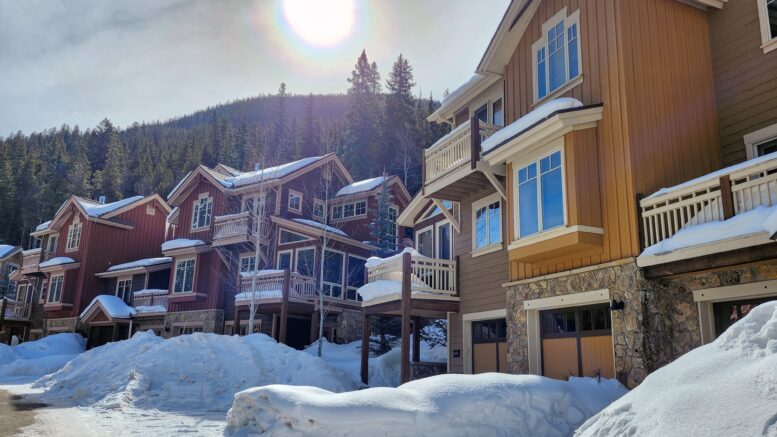A bill that sought to quadruple tax-assessment rates for Colorado owners of active short-term rental properties died at its first legislative committee hearing Tuesday, even after its author attempted to scrap the controversial tax hike in favor of studying the issue instead.
Sponsoring Sen. Chris Hansen, D-Denver, called Senate Bill 33 as a tax-fairness issue and garnered Gov. Jared Polis’ support as he argued that short-term rental owners now act like commercial properties and should pay the same rate as hotels to fund local services. As introduced, the bill would have boosted the 7.15% residential tax assessment rate on such properties to the 29% rate on commercial properties if owners rented the homes and condominiums out for at least 90 days per year.
Since the proposal emerged from the Legislative Oversight Committee Concerning Tax Policy in October, however, short-term rental owners and leaders of tourist-destination chambers of commerce have warned the change could decimate their economies. A Colorado Lodging and Resort Alliance study found that 89% of short-term rental owners would limit stays to 89 days or less per year, taking some 2.6 million booked room nights off the market, drying up visits and costing the state $1.4 billion in tourism revenue.
Sensing the growing opposition, Hansen postponed a hearing for nearly two months and circulated a proposed amendment Monday that would ditch the tax-assessment change and instead fund a study of the effect of short-term rentals on local-government services. That amendment also sought to end future carve-outs in which hotels would be reclassified as groups of individually owned condos and taxed at the residential assessment rate.
Even changes run into opposition

Colorado state Sen. Chris Hansen discusses a bill on the Senate floor during the 2023 session.
The last-minute nature of the change did little to quell opponents, who came to the Senate Finance Committee in droves to say that no stakeholding was done on the new plan and to oppose a clause seeking gifts, grants and donations for most of the study’s $225,000 cost. Numerous witnesses said they worried that the study, whose provisions seemed to focus on the costs of short-term rentals to local governments more than on their tourism or economic benefits, would draw funders wanting a pre-determined, anti-STR outcome.
So, committee members first rejected, without comment, Hansen’s attempt to amend the bill — an unusual move to oppose a sponsor seeking to change their own legislation. Then they voted 6-1 over Hansen’s lone “yes” to kill it, with Democratic Sens. Janet Buckner and Kyle Mullica joining Republicans in opposing it outright and Democratic Sen. Chris Kolker saying he couldn’t back SB 33 without the amendment.
“I have been conflicted on this bill a long time,” said Buckner, calling it one of the hardest votes she’s ever taken. “When I take a vote, I vote my constituents. I vote my conscience.”
The vote seemed to reflect the lopsided nature of the crowd that showed up to testify on it as well.
Short-term rental properties as security, nest eggs
Owners of short-term rental properties from Denver and Colorado Springs to Summit and Grand counties warned that quadrupling tax rates would cause them to take properties off the market for all but the highest-demand times such as ski season in the mountains. Doing so would defeat the aim of some bill backers to convert short-term rentals to longer-term rentals for area service-industry workers, as they’d neither have more housing options nor need them if visits dropped and retail and restaurant sales stagnated, they said.
Hearing complaints that corporations were buying housing at the expense of local residents, opponents Tuesday emphasized that they were Coloradans who owned one to two rental properties or sometimes just let rooms in their primary homes. A widow and an older man on Social Security both said their short-term rental income helped to defray the rising costs of property taxes and other expenses that they faced on fixed incomes, and others said their rental properties were their retirement nest eggs.

Chris Romer is president/CEO of the Vail Valley Partnership.
Meanwhile, business leaders from destination communities argued that the seasonal nature of tourism, particularly with its emphasis on winter, could not support year-round hotels, meaning that rentals housed the majority of visitors pouring money into their towns. They pointed to the CLARA study showing that 75.7% of short-term rentals are owned by Coloradans and said they opposed the tax hike and the late change that seemed bent on producing a study that would justify another tax-assessment hike attempt in the future.
“This is a bad bill. This is a bad amendment,” said Chris Romer, president/CEO of the Vail Valley Partnership, pleading for legislators to let short-term rentals be regulated on a local basis. “This bill negatively impacts people, businesses and communities.”
Backers sought data on impacts
Proponents of SB 33, almost all of whom were elected officials from counties where short-term rentals are increasing, said, however, that anecdotal evidence and local statistics have convinced them that the properties use an outsized amount of government services. Grand Fire Protection District Chief Brad White said short-term rentals account for 20% of the structures in his area but 42% of calls he gets, and Clear Creek County Commissioner George Marlin said such properties had an 11% higher volume of public-safety calls.
Park County Commissioner Richard Elsner said the study in the amended SB 33 would have provided specific information on exactly what impact short-term rentals are having on housing-stock availability, government services and quality of life. That should have been reason to back the bill after the proposed tax hike was eliminated, he and others said.
“I want to make sure we get any policy on short-term rentals right, and data helps us to do that,” Gunnison County Commissioner Liz Smith said. “Good data leads to good policy. We shouldn’t be afraid of it.”
One more short-term rental debate coming
But multilayered concerns over Hansen’s bill, which he has discussed for years, seemed to shut down even a willingness for people to accept a study coming from it. Once committee members rejected his attempt to slim down the bill, the final vote came quickly and largely without comment, signaling that Hansen would have to restart his effort if he is to revive the idea of reclassifying short-term rentals that are doing significant business.
“This topic deserves a better process than the one by which it has arrived in committee today,” said Melanie Mills, president/CEO of industry group Colorado Ski Country USA.
The death of SB 33 is not the end of discussions of whether short-term rentals should be reclassified as commercial property during the 2024 legislative session, however.
A slightly less controversial Bill, House Bill 1299, would reclassify short-term rentals as commercial property only if they are not the primary or secondary residence of owners, aiming to boost taxes only on those that are part of a larger portfolio. That bill, sponsored by Democratic Rep. Shannon Bird of Westminster and by Mullica, is scheduled for its first hearing Monday afternoon in the House Finance Committee.
